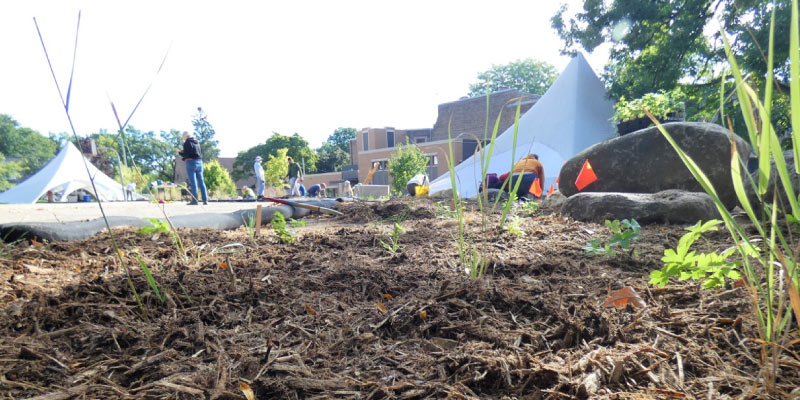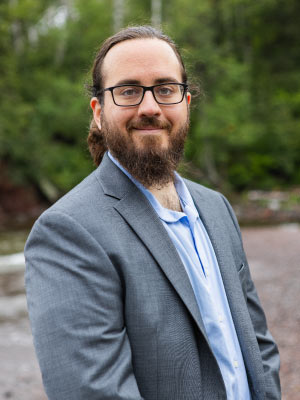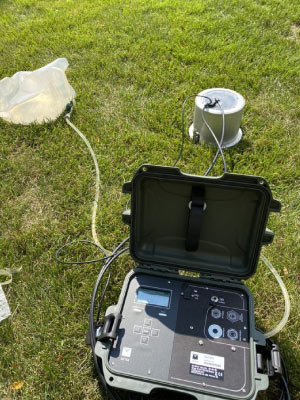
Hello, property owner! Do you have unsightly ditches ruining your curb appeal? Do these ditches tend to flood when it rains? Well, look no further than installing your very own rain garden!
Don’t worry, this isn’t an infomercial, but if that hook made you curious about rain gardens and their benefits, then a recent water resources management (WRM) cohort has the resources for you! WRM graduate James Winkelman and his project-mates completed a report analyzing Madison-area rain gardens along with the tools necessary for local property owners to start their own rain garden journey.
This project was years in the making, and for Winkelman, it came after a bachelor’s degree in environmental geoscience from the University of Buffalo and a seven-year–long career in education. It wasn’t until moving to Madison in 2017 that Winkelman began to search for a master’s program that would elevate his background in the environmental field.
In his search for the next step, Winkelman found the Nelson Institute’s water resources management MS, an easy choice as his wife, Julia, was working on her PhD within the atmospheric and oceanic sciences (AOS) department at UW–Madison. “For me, what really stuck out was the collaborative nature and working aspect of the WRM practicum,” Winkelman said.

While Winkelman may have spent the first part of his career teaching environmental education, it had been a while since he was on the opposite side of the classroom. His first class was Small Watershed Engineering with WRM chair, Anita Thompson. “Starting with an engineering class right out of the gate was a bit scary, but Anita was super understanding and made sure to answer any of my questions in office hours or whenever they came up,” Winkelman said.
As Winkelman continued in the program, he appreciated how customizable his degree was, even taking a few life science communication courses, like Photography for the Sciences. “I was like, ‘are you sure I’m allowed to take this course?’ And then they approved it,” Winkelman said. “It was super beneficial to me — learning about science communication and getting people interested in things.”
With a specialty in soil/water interaction, Winkelman was able to do a few projects with UW–Madison’s soil science department as well as gain some field experience. His specialty aided him as a teaching assistant for an undergraduate soil science class, but not as much when he assisted with AOS’s Climate Change 100 course, which is when he would turn to Julia. “She’d give me a lesson on anything I didn’t have that much experience in,” Winkelman said. “It was a big benefit to use her expertise and knowledge, and a perk of being able to collaborate with different departments.”
As part of the WRM practicum, students must form groups to tackle a contemporary problem in water resources. Winkelman and his group chose to research ways to improve water quality in Madison’s Lake Wingra, ultimately landing on rain gardens, a practice used to increase water reabsorption in a depressed area as well as treat polluted stormwater runoff. “Basically, getting plants to do the work before the water gets to a treatment plant or to our streams, rivers and lakes” Winkelman explained.
Each member of the group chose a section of the project to spearhead, with Winkelman choosing to lead the GIS mapping portion and plotting a section of the Lake Wingra watershed. From this, Winkelman and his group created an interactive map to show stakeholders and community members the feasibility of installing a rain garden on their property. “Hopefully the map will make it easier for property owners to find out if a rain garden will work out for them,” Winkelman said, “or let them know that they should find some other solution for their property, like a rain barrel.”

Winkelman’s group also completed infiltration testing on existing Madison rain gardens and even had the opportunity to help build a few. They hope their research will promote rain garden installation in Madison, but from surveys they conducted, know that there are barriers to entry for local property owners, specifically installation and maintenance education and confidence in how the project will turn out. Winkelman says the next step is for there to be a community base with leaders as contact points for others who have questions or concerns. Basically, neighbors helping neighbors.
Now graduated and working for the Wisconsin Department of Natural Resources, Winkelman is currently in the process of moving to California, Julia’s home state, as she accepts a post-doctoral position. Winkelman says he will be looking for a new position in California that hopefully intersects community education and science, just like his experience in the WRM program.
Learn more about the water resources management MS.